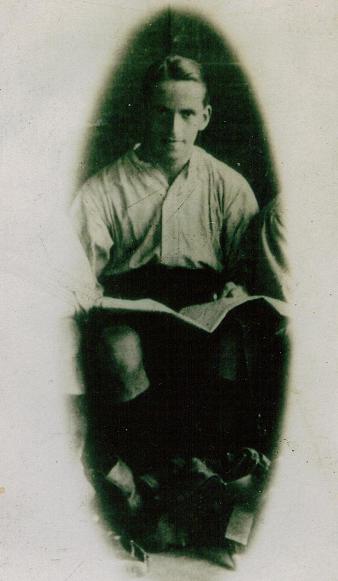| Huntly Gordon Stuart Brown |
| 2nd December 1889 - 9th March 1915 |
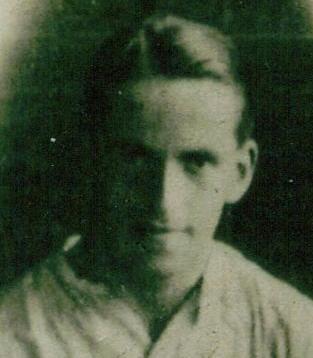
| Huntly Gordon Stuart Brown |
| 2nd December 1889 - 9th March 1915 |

Huntly died serving king and country in the Great War.
The High School of Glasgow Book of Service and Rembrance contains a brief biographical sketch (p. 27):
Huntly Gordon Stuart Brown, the fifth son and seventh and final child of
Peter Stuart Brown and Elizabeth Chapman,
was born on 2nd December 1889 at 11h 55m pm, at Braeside Avenue, Rutherglen,
Lanarkshire.
PRIVATE HUNTLY GORDON STUART BROWN, 9th Highland Light Infantry, 9th March, 1915. Private Stuart Brown died on 9th March, 1915, at Stobhill Hospital, Glasgow. On leaving school he entered the Clan Line Office, and was there for four years. He was then appointed cashier to the Empire Aluminium Co., Ltd., with which firm he remained till the outbreak of war. He had not been a Territorial, or received any military training, but he at once joined the 9th H.L.I. “A” Company, and after three months’ training at Dunfermline, went with his regiment to France, and was in the trenches early in December. On the 7th of January, 1915, near La Bethune, he was wounded by a gun shot through the forehead, above the right temple. When he reached the base hospital at Boulogne, the broken bones were extracted from the wound, and he seemed to recover. He was transferred to Bristol, and thence to Glasgow, but notwithstanding every possible attention, he died on 9th March. He was the youngest son of Mr. Stuart Brown, Auchengrange, Lochwinnoch.
Huntly Gordon Stuart Brown, mercantile cashier, private 9th Batt. H. L. S. Glasgow Highlanders (single),
died on 9th March 1915 at Stobhill Hospital, Glasgow. His usual residence was Auchengrange, Lochwinnoch.
He was 25 years of age. The causes of death of death were a gunshot wound to the head, (?) of bone and suppuration
of the brain, as certified by Alexander H. Edwards, Captain in the Royal Army Medical Corps. The informant on the
same day at Glasgow was P. Stuart Brown, father of the deceased, entered as present.
There is some confusion over the date of death; the above article, corroborated by the date engraved on his grave
stone give it as the 9th and since the death certificate confirms these sources, it is taken as settling
the issue. The 7th, however, is favoured by the Inventory of Huntly’s moveable or personal estate, in
which connection his brother, Charles Stuart Brown, deponed to it under oath.
This latter source confirms the place of death as Stobhill Hospital, Glasgow, and again designates the deceased
‘Huntly Gordon Stuart Brown, late of Auchengrange, Lochwinnoch, Renfrewshire, Private in the 9th
Battalion Highland Light Infantry (Glasgow Highlanders)’.
Huntly’s death was reported in the Evening Times on (Friday) 12th March 1915, at p. 2, in which
the date was again given as the 7th:
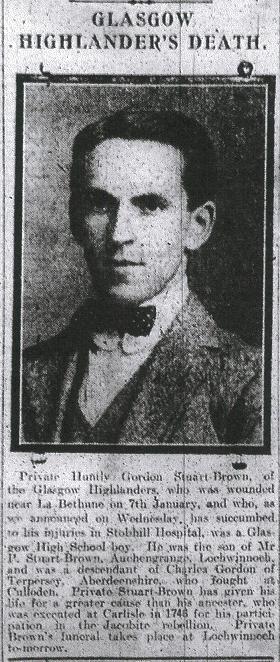
GLASGOW HIGHLANDER’S DEATH. Private Huntly Gordon Stuart-Brown, of the Glasgow Highlanders, who was wounded near La Bethune on 7th January, and who, as we announced on Wednesday, has succumbed to his injuries in Stobhill Hospital, was a Glasgow High School boy. He was the son of Mr P. Stuart-Brown, Auchengrange, Lochwinnoch, and was a descendent of Charles Gordon of Terpersey, Aberdeenshire, who fought at Culloden. Private Stuart-Brown has given his life for a greater cause than his ancestor, who was executed at Carlisle in 1746 for his participation in the Jacobite rebellion. Private Brown’s funeral takes place at Lochwinnoch to-morrow.
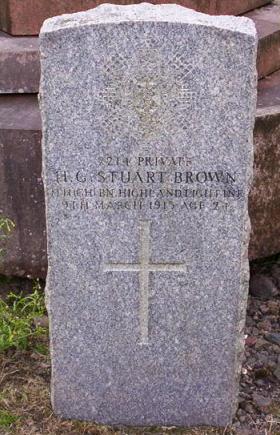
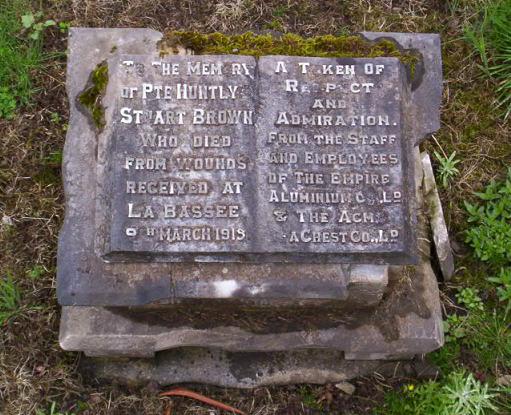
| Inventory |
Huntly Gordon Stuart Brown died intestate, leaving a total estate of £80 19/7d, composed entirely of moveable or
personal property situated in Scotland. (Wills and testaments Reference SC58/42/84, Paisley Sheriff Court, pp.
145-48)
This was made up of thirty £1 shares in the Acme Tea Chest Co. Ltd., nominally valued at £1, but actually worth
16/-, £30; ‘Sum in Dividend Warrant of the said Company in favor of the deceased, dated 21st January
1915, being dividend on said shares for year to 31st July, 1912’, £1 13/4d; ditto, ‘dated 27th
February 1915, being dividend on said shares for two years to 31st July 1914’, £3 6/4d; ditto, ‘dated
29th April 1915, being dividend on said shares for half-year to 31st January 1915’, 16/6d;
ditto, ‘dated 30th October 1915, being dividend on said shares for half-year to 31st July
1915’, 15/9d.
There were also thirty-five ordinary £1 shares; ‘Sum in Dividend Warrant of the said Company in favor of the
deceased, dated 10th June, 1915, being interim dividend on said Ordinary Shares’, 16/1d; ditto, ‘dated
1st December 1915, being final dividend on said Ordinary Shares for year ending 31st July,
1915’, £2 6/8d.
There was one final item, the only one not relating to shares in the Acme Tea Chest Co. Ltd., ‘Balance of Salary due
to deceased by the Acme Tea Chest Co. Ltd., Glasgow’, £6 4/11d.
These sums in aggregate yield a ‘Gross Moveable Estate in Scotland’ of £80 19/7d.
At Glasgow on 21st January 1916, Charles Stuart Brown appeared in the presence of ‘John Orr, Esquire,
One of His Majesty’s Justices of the Peace for the County of the City of Glasgow’ and on being solemnly sworn and
examined, deponed to the usual matters.
At Paisley on the 25th, Brownlie, Watson & Beckett, writers, of 225, West George Street, Glasgow,
presented the Inventory for Registration.
William Beckett, writer, and William McGhie, also of 225, West George Street, Glasgow, both compeared and, on
being solemnly sworn and examined, deponed to knowing Charles Stuart Brown as the brother of the deceased.
